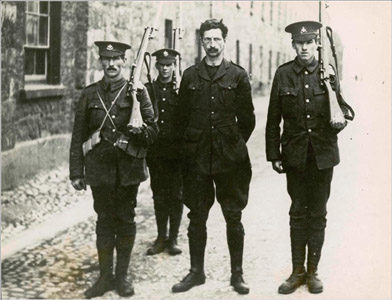Note: If you wish to receive, via e-mail, (1) my weekly newsletter or (2) daily copies of these posts, notify me at [email protected] and indicate which you would like. I promise not to share your e-mail address with anyone. To unsubscribe, send me a follow-up email.
Wednesday
My favorite exhibit in Dublin has been one devoted to the Easter 1916 rebellion and housed in the very post office where the leaders barricaded themselves before being finally captured. I knew about the event from William Butler Yeats’s great poem about it, and the exhibit both filled in many of the gaps and confirmed the astuteness of Yeats’s insights.
The uprising occurred when a handful of Irish nationalists, hoping to spur Ireland into rebellion against British rule, seized various posts around Dublin, including the General Post Office. The rebellion was brutally put down, the leaders were executed, and three thousand Irish, many innocent, were thrown into prison. While most people were against the rebellion in the beginning, sympathy for the rebels swelled following the British crackdown and the republican movement took on new life. The wheels had been set in motion for independence for the southern five-sixths of the island.
The exhibit included various historians discussing the uprising, one of whom emphasized the theatricality of the event. Although it was a lost cause from the beginning, he said, it was staged so dramatically that it caught the Irish imagination. As he made his point, I thought of the Luis Borges short story “Theme of the Traitor and the Hero.”
In it, the author mentions a staged assassination designed to turn a political actor into a martyr so as to help the cause. Perhaps Borges had the Easter Rising partially in mind since he sets the story in Dublin. In any event, the story has a similar outcome: “MacDonagh and MacBride and Connolly and Pearse” (to quote Yeats’s poem) have become mythical figures while, in the story, Fergus Kirkpatrick dies theatrically, also inspiring future revolutionaries.
Borges being Borges, there’s a twist: the Irish activists plagiarize from Shakespeare to stage the assassination of their leader Kirkpatrick, who, it turns out (and unbeknownst to him) is actually a traitor. For the sake of Irish independence, he acts the part:
The condemned man entered Dublin, discussed, acted, prayed, reproved, uttered words of pathos, and each of these gestures, to be reflected in his glory, had been pre-established by Nolan [the stage manager of the assassination]. Hundreds of actors collaborated with the protagonist; the role of some was complex; that of others momentary. The things they did and said endure in the history books, in the impassioned memory of Ireland. Kilpatrick, swept along by this minutely detailed destiny which both redeemed him and destroyed him, more than once enriched the text of his judge with improvised acts and words. Thus the populous drama unfolded in time, until on the 6th of August, 1824, in a theater box with funereal curtains prefiguring Lincoln’s, a long-desired bullet entered the breast of the traitor and hero, who, amid two effusions of sudden blood, was scarcely able to articulate a few foreseen words.
Needless to say, the Easter rebels weren’t this deliberate. But two of them were poets and their uprising captured the attention of poets, including Yeats. “A terrible beauty is born,” he wrote, and in tomorrow’s post–which I’ll be writing on the train to Belfast–I’ll dive into the powerful things he has to say about idealism and fanaticism.
